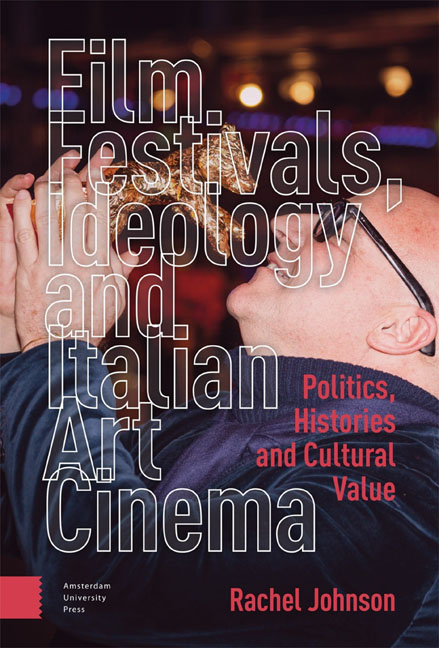2 - Enjoy Your Auteurism! The Son’s Room at Cannes
Published online by Cambridge University Press: 13 April 2024
Summary
Abstract: Through the case study of Cannes award-winner, The Son's Room (Nanni Moretti, 2001), this chapter interrogates film festivals’ selfpresentation as institutions that “take nothing into account other than the art of film” (Gilles Jacob cited in Elsaesser, 2005, p. 98). I argue that European A festivals mobilise the auteur as a figure of artistic universality and anti-commercial purity—a means of disavowing their statuses as enterprises engaged in a struggle for the very definition of art. I use Nanni Moretti's ambivalent authorial persona in The Son's Room to “speak back” to such disavowal, showing how Moertti's self-conscious performance of auteurism highlights the contradictions of the auteur as at once a symbol of artistic freedom and product of commercial constraint.
Keywords: auteur theory, art cinema, Nanni Moretti, film festivals, Italian cinema, film authorship
A close family in a small northern Italian city. The father, Giovanni, the mother, Paola and their two teenage children: Irene the elder and Andrea, the younger. Giovanni is a psychoanalyst. In his consulting-room next to his flat, his patients confide their neurosis to him, which contrasts strongly with his own quiet existence.
One Sunday morning, Giovanni is called by a patient for an emergency. He is not able to go jogging with his son, like he had told him. Andrea leaves to go scuba diving with friends and he never comes back from it…
‒ Synopsis of The Son's Room in the Cannes 2001 print and online programmeIntroduction
It has been well documented that European A festivals differentiate themselves from other cinematic institutions through their “professed commitment to artistic excellence and nothing else” (Elsaesser, 2005, p. 95). This was demonstrated recently in a contradictory and politicised edition of Cannes. The 2018 edition took place in the context of the #MeToo and “Time's Up” movements, both of which called for an end to discrimination against women in the film industry. That year, Cannes's main competition was judged by a female-majority jury led by Cate Blanchett, and the festival was marked by several protests for gender equality.
- Type
- Chapter
- Information
- Film Festivals, Ideology and Italian Art CinemaPolitics, Histories and Cultural Value, pp. 65 - 98Publisher: Amsterdam University PressPrint publication year: 2023



